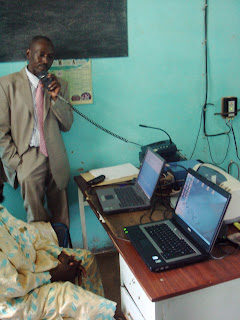

While in Mali I visited a regional communications center that transmitted market information collected by a market enumerator (see photo to right). The enumerator's job is to observe real market transactions taking place on a variety of important crops. That information is then transmitted by a form of ham radio to other regional centers and to the capital, Bamako.
Internet access in Africa is very expensive and unreliable. Most of the places we visited were using vstat connections. Those links are running about $1,000-1500 per month for a 128-256Kb connection. The use of a radio based system was not a great solution in terms of speed and each center does have to have a tall tower, but at least the costs of running the centers are not high once they are going. This is a very good example of a way to handle some of the harsher technology environments. And, by the way, the room we were in was almost 100 degrees and humid. How the head of the center was able to keep his coat on was a mystery to me. I was afraid to ask how long computer equipment would last in such an environment.
T
2 comments:
This is interesting - transferring data over the use of radio waves. I would assume the reason is that they can travel greater distances, though the bandwidth would be reduced. With poor infrastructure in Africa and other areas of the world, it seems that data connections will be spread using wireless connections, not the fiber optic lines that we find in more developed nations. It's similar to the way that much of the Middle East skipped right over landline telephones and went to mobile G3 technology.
"Poor infrastructure" just begins to describe the conditions in rural areas of Mali. The radio shown in this posting is connected to car batteries because the local electricity is so undependable.
As for cell phones leaping over landline phones, that is clearly happening. We think of cell phones as more advanced, but for people there they represent devices with their own power source. New technologies don't always appear for the same reasons they do here.
T
Post a Comment